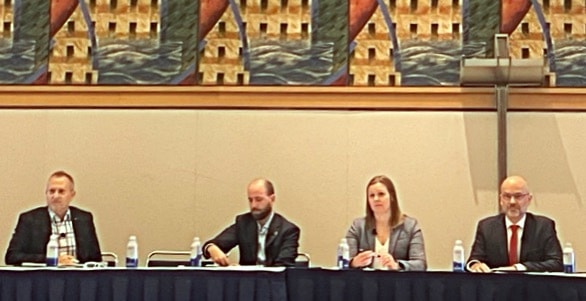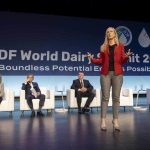
Dairy farmers must tell investors and consumers what they are doing on sustainability issues if they are to win the confidence of the investment community, a panel of investment advisers said here last week at the International Dairy Federation’s World Dairy Summit.
Will Pomroy of Federated Hermes, a United Kingdom firm, said, “The
investment industry is already committed to ESG [environmental, social and governance investing]. Investors are demanding it.”
The dairy industry is high in greenhouse gas emissions, land use and water use, he noted. Reducing emissions and communicating that message are “the license” that the dairy industry needs “in order to tell the positive message,” he said.
The U.S. dairy industry has 28,000 farms with 9 million cows and the Farm Credit System is the largest lender in U.S. dairy, Amanda Darow of CoBank said.
GREEN PROGRESS
Methane digesters and more solar energy on farms and feed additives can “help dairy’s green progress,” she added, noting that California’s low carbon fuel program has helped reduce the state’s greenhouse gas emissions.
Investors see the advantage of the low carbon fuel standard in California, she said.
The discipline to analyze the risk of companies not being able to pay back loans “is developing very rapidly,” Hans Helbekkmo, a partner in McKinsey and Company, said.
“Banks care about unwanted publicity,” Helbekkmo added. Farmers should not think of the investment industry as just a source of money but a source of advice, he said.
Thomas Lee Bauer, a World Bank official who moderated the panel, noted that there are no farmers within the bank and said that dairy farmers must bring their message to the bank.
Bauer said he has pushed back against proposals to finance alternative proteins because “emerging markets don’t want it” and “they haven’t shown their actual life cycle analysis.”
The failures of alternative proteins “have been taste, price point and nutrition,” he added.
“The science community needs to talk to the banking community,” Bauer said. “There needs to be a good advocate for the industry to make sure the right science is being discussed publicly.”
At the end of the session, the panelists seemed to agree that the dairy industry would be considered medium risk but that alternative proteins would be considered higher risk because they are so new and it is unclear whether consumers will accept milk produced in laboratories.
























